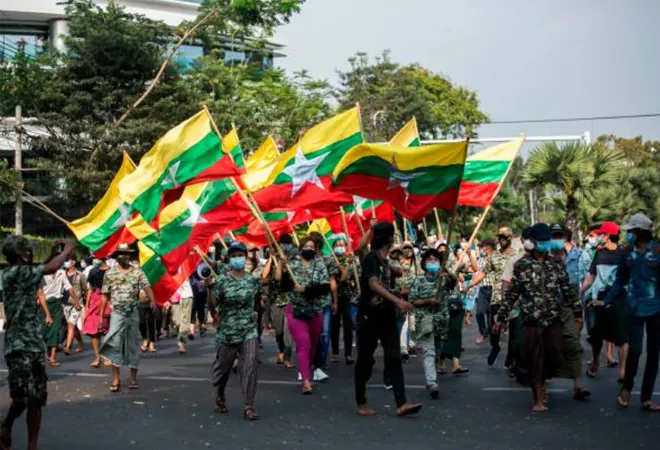-
CENTRES
Progammes & Centres
Location

Since Myanmar’s military coup on 1 February 2021, more than hundred thousand Myanmar nationals have fled the nation either to India or Thailand, escaping the brutal crackdown by the Junta. Approximately, more than 16,000 Myanmar nationals have crossed into the four bordering states of India namely Manipur, Mizoram, Nagaland, and Arunachal Pradesh in a desperate attempt to find a safe haven. The majority of the influx has been in the state of Mizoram, which clocked 9,247 Myanmar nationals after the Chief Minister of Chin state took refuge there in mid-July.
The 510-kilometre border shared between Myanmar and Mizoram has become a primary entry point for people fleeing persecution. India’s reaction to the developing displacement crisis in Myanmar has put the government in a tough spot, as it tries to appease both domestic and international stakeholders. On the one hand, India must maintain a delicate balancing act with the Myanmar Junta to avoid ruffling its feathers; on the other hand, it must handle the difference of opinion with the state of Mizoram. In order to prevent more numbers of displaced people from Myanmar, India has asked to seal off all entry points along its unfenced border. On 10 March, the Ministry of Home Affairs (MHA) directed the border sharing states to check the influx of people from across the border and called for illegal migrants to be identified, detained, and deported.
India’s reaction to the developing displacement crisis in Myanmar has put the government in a tough spot, as it tries to appease both domestic and international stakeholders.
However, the order has not been received well in Mizoram, where people share deep ethnic and familial ties with residents of Myanmar’s Chin state. The handling of the displaced Myanmarese has become an emotive and sensitive issue in the state. Mizoram’s state administration has gone against the national government, requesting protection for the displaced people as they consider them their brothers, with a shared ethnic identity in the Chin community.
Politically drawn borders have played an important role in separating people who share similar historical and cultural linkages. The Mizo and the Chins are a perfect example of the same, who are both Zo people, sharing the same ancestry and ethnic ties. The difference in name and dispersal across international borders resulted from a British colonial policy that drew borders on political grounds rather than ethnic ones. However, respecting such sentiments, the border with Myanmar along Manipur and Mizoram is largely unfenced in order to preserve cultural linkages between tribes on either side. In addition, there is also a unique arrangement known as the Free Movement Regime (FMR), which allows residents on either side to go up to 16 kilometres into the other side and stay there up to 14 days without visas. Additionally, people from both sides travel casually for educational or shopping purposes.
While this may be true, the displacement crisis has been gaining ground over the past few decades. The Chin people have been one of the minority ethnic groups to face widespread and ongoing ethnic and religious persecution at the hands of the Tatmadaw since 1962. They have been subjected to forced labour, arbitrary arrests, unlawful detention, and extrajudicial killings. Such treatment has incited mass exodus to neighbouring nations. India is the most common destination, given its close proximity and ethnic ties, yet they are not given refugee status since India is not a signatory to the 1951 Refugee Convention or its 1967 Protocol, thereby, putting these people in a precarious situation as no legal status, proper livelihood, education, or healthcare is provided to them.
The recent coup has made matters worse since the crackdown on pro-democracy activists as well as ethnic groups is growing in intensity. In recent weeks, more than 900 protestors post-coup have been killed while more than one hundred thousand have been injured or detained. People belonging to Myanmar’s Chin community along with other ethnic and majority groups are fleeing across the border to Mizoram to escape a military crackdown. A large number of people entering the Indian side are law makers, policemen and their families and even some army personnel who reportedly refused to shoot the protesters opposing the military rule. Even, the Chief Minister of Myanmar’s Chin state, Salai Lian Luai, has taken asylum.
The Mizo Students’ Union in Mizoram urged the state government to provide asylum to the hapless people on humanitarian grounds and give them legal status.
They are being provided with accommodation and food by civil society organisations and student bodies, while many are sheltered by the locals. However, after the central government issued an order for the deportation of illegal immigrants who do not have the required documentation for travel, several Mizo village council authorities have issued letters and statements affirming their willingness to accommodate the displaced in the wake of the crisis. The Mizo Students’ Union in Mizoram urged the state government to provide asylum to the hapless people on humanitarian grounds and give them legal status.
The Mizoram government and the Centre have differing views over the influx of Myanmar Nationals. New Delhi’s position on the coup is at variance from the policy adopted in the aftermath of the bloody crackdown in 1988 when hundreds of pro-democracy activists were shot in Myanmar. Relief camps in Manipur and Mizoram were opened for activists fleeing the crackdown. They were allowed to stay without any pressure on repatriation. However, over the years, the importance of Tatmadaw has increased significantly for India’s own security reasons and its influence has grown in terms of geostrategic as well as economic implications. A friendlier approach has, thus, been adopted to strengthen India’s own footprint within the nation. The post-coup approach is based on these dynamics where New Delhi is careful in its tactics, focussing more on a dialogue-based approach.
Although India has a lot at stake in Myanmar in terms of security and geopolitical interests, but the government cannot sideline the sentiments and views of the Northeast people.
However, the coup in Myanmar and the Junta’s crackdown has evoked a strong emotional response in India’s Northeastern states. The Chief Minister of Mizoram, Zoramthanga, has responded with the same regard and has written to the Prime Minister stating it cannot turn a blind eye to the humanitarian crisis. He has urged the Centre to review its order.
Although India has a lot at stake in Myanmar in terms of security and geopolitical interests, but the government cannot sideline the sentiments and views of the Northeast people. Moreover, if the situation in Myanmar continues to worsen, the displacement issue will spread to other states sharing open or porous borders. Moreover, New Delhi’s appeasement of the Tatmadaw in recent months could trigger angry protests, and, perhaps, provide a fresh lease to anti-India insurgencies in the Northeast.
The divergent positions of the Indian government and the state government, as well as the ramifications for Delhi's ties with the Junta, emphasise the need for domestic refugee laws in India, which is currently lacking. Since Indian law does not provide any proper definition to who a refugee is, the government can brand all refugees and asylum seekers under the term “illegal migrant”. India’s lack of a formal legal framework, domestically and internationally, has allowed it to follow an ad hoc policy regarding refugees. The impending Myanmar refugee crisis poses a governance challenge in India due to lack of a unified legal and institutional framework to address the same. A well-crafted and thoroughly formulated national refugee law can avert any collapse and achieve a balance between human rights and national security in the event where the regional mechanism collapses, while taking into account domestic socio-economic and political circumstances. Adopting such legal framework will have both pragmatic and normative benefits, assisting the Indian goal of becoming leader in South Asia that comprises of many multicultural and multi-ethnic communities.
Tarushi Singh Rajaura is a Research Intern at ORF, New Delhi
The views expressed above belong to the author(s). ORF research and analyses now available on Telegram! Click here to access our curated content — blogs, longforms and interviews.

Sreeparna Banerjee is an Associate Fellow in the Strategic Studies Programme. Her work focuses on the geopolitical and strategic affairs concerning two Southeast Asian countries, namely ...
Read More +